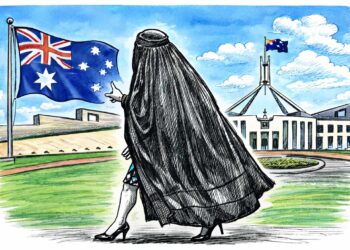By Suhas Chakma
For most of human history human rights did not exist. The struggle to secure them arguably began in 1215 with the Magna Carta in England, which promised protection from illegal imprisonment as a right.
But it took another 733 years and the Universal Declaration of Human Rights, for those rights to be enshrined for all.
Now, just 76 years later, they’re at risk of being lost.
Amid an ongoing and very public massacre in Gaza, to which the countries of the West remain mute spectators or enablers, the moral distinction between the liberal democracies of the West and the illiberal democracies and dictatorships among the rest is disappearing.
An estimated 40,000 Palestinians, many of them babies, children and women, have been killed in the Israeli massacre in Gaza which began after a terror attack by Hamas that killed 1,478 Israelis, most of them civilians.
The victims of Israel’s attacks include 113 journalists and 224 humanitarian aid workers, of whom 179 were employees of the United Nations Relief and Works Agency for Palestine Refugees. There are also credible accusations of sexual crimes by Israeli forces.
The Western and especially the American response to all this, ranging from silent nods to standing ovations for the Israelis, may enable other governments around the world to justify all manner of human rights violations in the name of national security.
The rise and fall
The fall of the Berlin Wall in 1989 and the subsequent collapse of totalitarian regimes across Eastern Europe and in the former Soviet Union ushered in a new era of freedoms, rights and democracy in those parts of the world.
The United Nations organised a series of world conferences in the post-Cold War period starting with the 1992 Earth Summit in Rio, the 1993 World Conference on Human Rights in Vienna, the 1995 World Conference on Women in Beijing, and the 1995 World Summit for Social Development in Copenhagen.
Governments and Non-Government Organisations were mobilised for these conferences and the world saw an unprecedented growth of non-profit organisations, including many that worked in the area of human rights.
In some nations ruled by autocrats, who sought to suppress non-government organisations, especially human rights organisations, assistance from the West was their lifeline.
Western liberal democracies stood as the moral vanguard often critiquing the crackdown, and their media amplified this.
The September 11, 2001 attacks in New York by Al-Qaeda changed that.
The US’s PATRIOT Act encouraged other countries to adopt similar anti-terror legislation. The targeting of human rights organisations and activists under anti-terror laws began soon after and became a worldwide phenomenon.
By 2012, India had made “dissent” including causing or intending to cause disaffection against India a terror offence under its anti-terror law, the Unlawful Activities (Prevention) Act.
The law was amended in 2019 to enable individuals to be designated as terrorists without due process. Consequently, in 2024, Booker Prize-winning author Arundhati Roy became one of the accused under this law, for an alleged speech about Jammu and Kashmir in 2010.
The most significant negative impact on human rights groups worldwide from the September 11 attacks arose from the expansion of the mandate of the Financial Action Task Force, initially established in 1989 by the G7 to develop policies to combat money laundering.
It expanded its mandate to include “terrorism financing” in 2001. The FATF issued several guidelines to ensure no terror financing by non-profit organisations.
Governments around the world have since used this as a tool to throttle funding to NPOs.
In 2010, India was found non-compliant by the FATF’s Mutual Evaluation Report on NPOs, clearly stating that “India has not demonstrated that measures are in place to sanction violations of oversight measures or rules by NPOs or persons acting on behalf of NPOs for NPOs other than those registered under the Income Tax Act and under the FCRA”. The report suggested India amend its laws on non-profits.
India subsequently amended the Foreign Contribution Regulation Act, 2010 (FCRA) in 2020 to further restrict the inflow and use of foreign funds. In the last decade, FCRA licences of more than 20,693 NGOs have been cancelled.
The most prominent human rights organisation in the world, Amnesty International, faces charges of money laundering in India and was forced to halt operations there in 2020 after its bank accounts were frozen.
The FATF evaluation published in June 2024 was cited by the Indian Government for repeated extensions of the tenure of the Chief of Enforcement Directorate S.K. Mishra, a favoured bureaucrat of Prime Minister Narendra Modi. The Enforcement Directorate is the strong arm of the government responsible for cases against numerous opposition politicians and the first-ever arrest of an incumbent chief minister, Delhi’s Arvind Kejriwal.
India is not alone. Across the world, the FATF recommendations have been used to effectively close down non-profit organisations.
Economics and nationalism
The rise of China and India intensified an already existing debate about development assistance in the West. Then the 2007-08 financial crisis happened.
After that, state and private donors simply did not have adequate funds to share, and development assistance came under stress and scrutiny in the West. The COVID-19 pandemic and the war in Ukraine have further dried up resources.
For human rights organisations in the Global South, which were largely sustained by financial assistance from Western countries, the combination of state repression and fund crunch have been fatal.
As right-wing nationalism has taken centre stage in country after country, from India to Brazil and Hungary to the US in the last decade, authorities have taken measures to block foreign funding to NGOs to prevent “foreign interference”.
The issue for governments is sovereignty and national security. As we are witnessing with Gaza, there are no limits to what can be justified through such arguments.
The effective ban on foreign funding and the Soros Foundation in 2018 by Viktor Orbán of Hungary, a recipient of the Soros Foundation’s scholarship to study at Oxford, epitomised the backlash against rights and democracy issues in the West. The European Union stood by as a mute witness as Orbán made Soros the scapegoat of the far right.
Governments copy one another in their rhetoric and tools of repression.
Russia’s Foreign Agent Law of 2012, which requires anyone who receives support from outside Russia to declare themselves as foreign agents, is being replicated in Georgia, Kyrgyzstan, Slovakia and Hungary, just the way India’s FCRA law was replicated in Bangladesh which established an NGO Affairs Bureau to control foreign funding.
However, it is not in Russia, but in the West that one can find older laws that arguably set the template.
The United States has had a Foreign Agents Registration Act since 1938 that requires public disclosures from “agents of foreign principals engaged in political activities”, although the law is not evenly applied.
The United Kingdom is leading the way in setting a template for targeting environmental defenders.
In July 2024, five environmental activists were charged with conspiracy to cause a public nuisance for organising direct action protests that caused gridlock on London’s orbital motorway in November 2022. They face long sentences after being found guilty.
If history is any guide, this action of the United Kingdom will soon reverberate in its former colonies and the world.
Suhas Chakma is Asia Campaign Manager for the IPLP Initiative on Indigenous Peoples of the University of Arizona and Director, Rights & Risks Analysis Group.
Originally published under Creative Commons by 360info, August 2024










